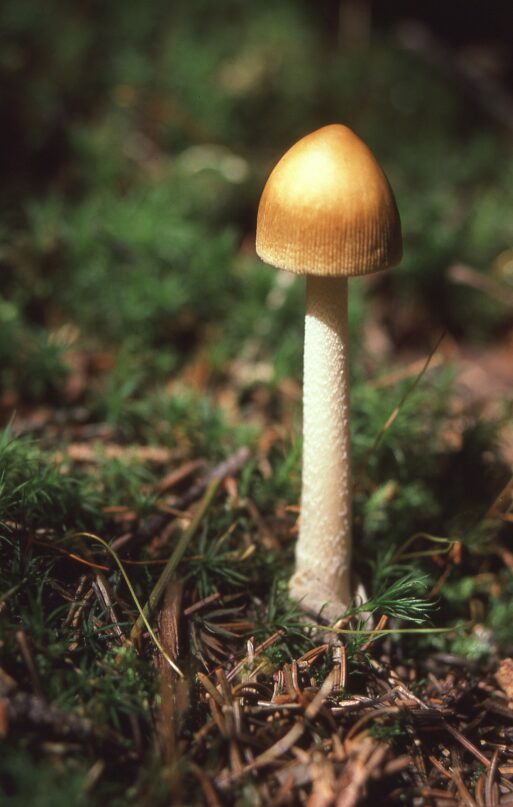
Photo by Michael Hamments on Unsplash
A study published this month in the Canadian medical journal Palliative Medicine found that nearly 80% of Canadians approve the use of psilocybin for end-of-life care to ease existential distress.
The study, based on a survey of 2,800 Canadians, marks a notable turn in public perception since the drug’s emergence more than 60 years ago. Dubbed “magic mushrooms” by the 1960s counterculture that first embraced it, psilocybin was banned in Canada in 1981.
But as study team leader Michel Dorval noted, several studies in recent years have shown the potential benefits of psychedelic substances in treating cancer patients suffering end-of-life anxiety.
A Mystical, Transformative Experience
“This substance can bring about a profound awareness that leads the patient to view existence from a different perspective,” said Dorval, professor at Université Laval’s Faculty of Pharmacy and researcher at the CHU de Québec-Université Laval Research Center. “Treatment with psilocybin, combined with psychotherapy, can produce relief for up to six months.”
Multiple studies, many of them in the U.S., have documented participants describing their psilocybin treatment as mystical and life-changing. Their reports often mirror the out-of-body events associated with near-death experiences.
As one of the participants in an early U.S. study told The New York Times, “I now have the distinct sense that there’s so much more … so many different states of being. I have the sense that death is not the end but just part of a process, a way of moving into a different sphere, a different way of being.”
Other participants have felt that they were receiving a preview of what happens after death, which reduced their fear of the inevitable.
Government Restrictions on Hallucinogens Slowly Easing
Although the sale, possession and production of psilocybin is illegal in Canada, as it is under federal law in the U.S., restrictions have been easing over the past five years in both countries.
In 2022, Canada created a special access program, similar to the Right to Try Act passed in the U.S. in 2018. The program makes it possible to obtain an exemption from Health Canada to use psilocybin for medical or scientific reasons. A doctor can apply on behalf of a patient if psychotherapy, antidepressants or anxiolytics have failed, or if the patient’s condition requires urgent intervention.
The intent of the Université Laval’s study was to determine if Canadians were aware of the program and if they believed psilocybin is a reasonable choice for palliative care patients suffering from existential distress.
The study found that approval of psilocybin for end-of-life use was strongest among participants who had a connection to someone with a terminal disease.
“Having been close to loved ones at the end of life, or having witnessed their distress, could explain this openness to new approaches designed to help people at this stage of their lives,” suggests Dorval.
Approval was also high among people who had tried psilocybin at some point in their lives. In many Canadian cities, psychedelic mushrooms are openly sold from storefronts.
Public Acceptance Growing in the U.S.
Although not as robust as Canadian acceptance, approval of psilocybin for end-of-life treatment and other therapeutic use is growing in the U.S.
Borrowing a page from the cannabis movement, advocates have been gaining traction at the state level. In 2020, Oregon voters passed a ballot measure making it the first state to both decriminalize psilocybin and also legalize its supervised use. Colorado followed with a similar measure in 2022.
Last year, the Florida-based nonprofit End of Life Psychedelic Care began operating to educate the public on the use of psychedelics and their benefits in a hospice environment. They also match patients with professionals trained in both psychedelics and end-of-life.
Another indicator of broadening acceptance in the U.S. is action at the federal level. In January, the U.S. Department of Veteran Affairs announced it will be funding studies on psilocybin, as well as MDMA (commonly known as ecstasy) for treating PTSD and depression.
Perhaps in the near future, the U.S. and Canada will catch up with Australia, which last year became the first nation in the world to name psychedelics as medicine.

 Nearly 80% of Canadians Support Psilocybin for End-of-Life Care
Nearly 80% of Canadians Support Psilocybin for End-of-Life Care



 “Help Me, Helen”
“Help Me, Helen”
 Recovering Cremation Remains After the Los Angeles Fires
Recovering Cremation Remains After the Los Angeles Fires
 “As Tears Go By” by Marianne Faithfull
“As Tears Go By” by Marianne Faithfull














